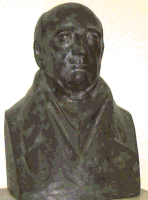 | Baron vom Stein
Home English abstract English abstract  Baron vom Stein Baron vom Stein | | | | There are a good many schools in Germany that bear the name of the Prussian reformer Baron vom Stein. But quite in contrast to most of those schools, Freiherr vom Stein Gymnasium at Luenen can boast a real, biographical link to the school’s patron: After withdrawing from state office in 1815, Baron vom Stein chose as his seat of retirement Cappenberg Manor House, an estate situated in beautiful countryside just north of Luenen’s city limits. | | | | The following is an English adaptation of the German-language résumé on Baron vom Stein as printed in Meyers großes Taschenlexikon in 24 Bänden (i. e. Meyer’s grand pocket encyclopaedia in 24 volumes). | | Who was Baron vom Stein? |  | Heinrich Friedrich Karl Reichsfreiherr (i.e. Imperial Baron) vom und zum Stein * Nassau (in Hesse) October 25, 1757, + Cappenberg (in Westphalia, near Luenen) June 29, 1831. German statesman and reformer of Prussia. Baron vom Stein descended from a family of Imperial knights. In 1780 he entered the public service of the Kingdom of Prussia. As Secretary of State for Finance and Economy (1804 to January 1807) Stein tried to prepare the Prussian state for the impending conflict with Emperor Napoleon I of France. In those preparations, Stein was successful with regard to economy and fiscal policy but failed in achieving his main objective: Attempting to abolish government by Royal Cabinet and to replace it by a modern form of ministerial government accountable to a parliament, he was blocked by traditionalists oriented on old Prussian values. After the Peace of Tilsit, Stein, on September 30, 1807 (until November 1808), was made Minister-in-Chief of the Prussian government. In that capacity he managed to bring about fundamental political reforms. However, he could not realize more daring reform plans like the de-centralizing of regional administration or the installation of an assembly of the representatives of the Estates. When Napoleon I gained control over much of the Prussian territory, Stein fled to Russia and became political advisor to Tsar Alexander I. In that position, Stein negotiated the alliance between Russia and Prussia (1813) and became Chief Administrator of the territories occupied by the troops of the alliance. | | This bust of the baron is on display in the halls of Freiherr vom Stein Gymnasium. | | |  | | Cappenberg Manor House, where Baron vom Stein spent his years of retirement, lies at Luenen’s northern city boundaries and is owned and inhabited by direct descendants of the baron to this day. Most of the manor house and surrounding park are open to the public. | During the Congress of Vienna (September-October 1814 to June 1815), at which European nations tried to create a stable political order after the turmoils of the French Revolution and the reactions to it by conservative European régimes, Stein was a member of the Russian delegation. In 1815 he retired from public service into private life at an estate in Cappenberg, Westphalia, near Luenen, and founded the »Society for Old German Historiography«, which soon began to publish Monumenta Germaniae historica, a series of scholarly editions of early German historical documents.
Adapted from:
Meyers großes Taschenlexikon in 24 Bänden: 4th completely revised edition. Published and updated by the editors of Meyer’s Encyclopedia. Mannheim/Leipzig/Wien/Zürich: B.I. Pocket Books, 1992 | | |  | | | |


